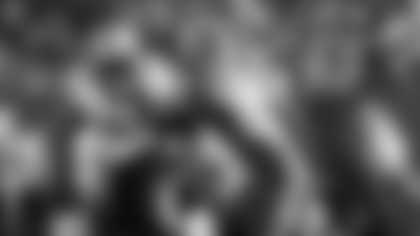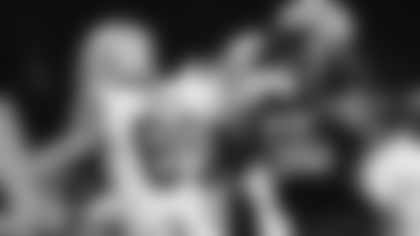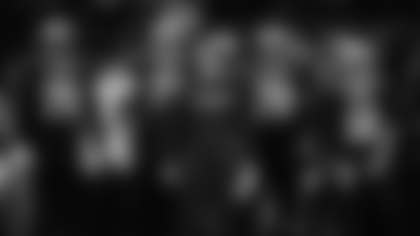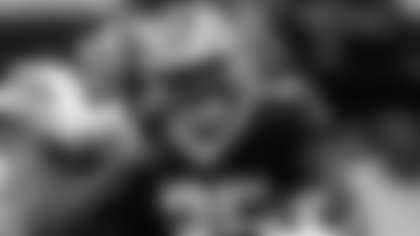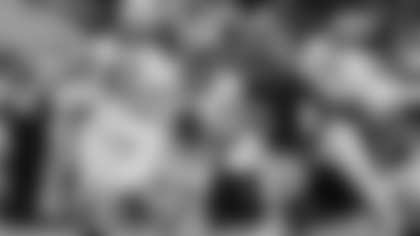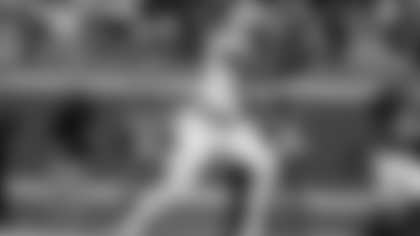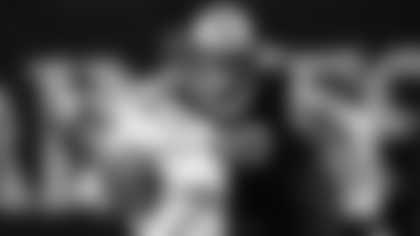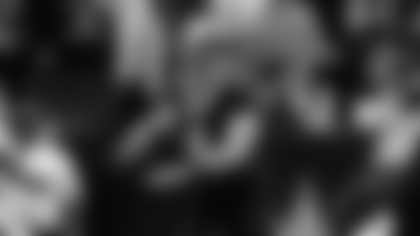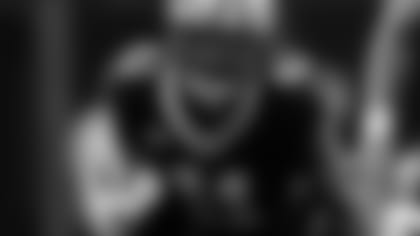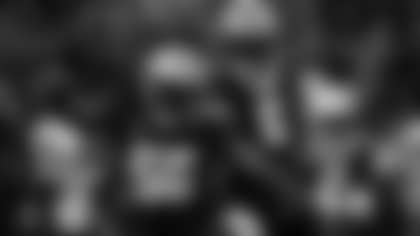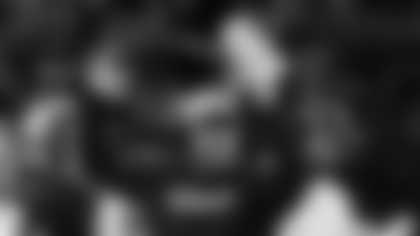New Orleans Saints receivers coach John Morton was the featured guest on Friday's Black and Blue Report podcast. Morton talked about the NFL Combine where he allowed NewOrleansSaints.com behind-the-scenes access to see what an assistant coach's role is like at the combine. You can read John DeShazier's story here. Below is the transcript from Morton's Black and Blue Report interview.
First of all, good morning Coach, thanks for being with us.
"It's great to be here, thanks for having me on the show."
How was it having John DeShazier on your hip there for a couple of days?
It wasn't too bad. Those guys did a good job. I felt like I was getting babysat a little bit somehow. I thought it was good. Thought it was a good idea to have somebody shadow a coach and kind of see what they go through."
There is no doubt that it is a piece that reveals a lot about your process, the Saints process and what actually goes on at the NFL Scouting Combine. It was fascinating to me to kind of almost, through John DeShazier's eyes, watch you guys march through what seems at times like organized chaos. Is that a fair assessment?
"Yeah, pretty much. For what the players have to go through, I went through it as a player a long time ago, it's a long process. Those guys have to go through a lot and it's tough on them."
John, what's the difference between when you went through the process as opposed to what it is now?
I think it's pretty much the same thing except for the interview process is more organized. Back when I went in 1993, you go through and see the doctors, if you're in the hallway guys are just grabbing you. Teams would just grab you and start interviewing you. Now there's a process where it's organized, you have to be here at a certain time and all the players show up. I think that's a lot better than it was back then because players were just everywhere and so where the coaches. Sometimes you could interview a player and sometimes you couldn't because you didn't know where he was. I think the way they do things now is a lot more structured and you get a lot done.
It seems to me even with it being more organized now, Coach, it's almost overwhelming. When you read John DeShazier's piece or you watch it from afar, is there a best way to try and maximize those days in Indianapolis and kind of keep it where it where it becomes a productive session for you and your staff?
Well, the biggest thing I get out of it is the interview process. Getting to know these guys, where they're from, their background, how they're raised, what do they like to do, are they football guys and just trying to figure that out. That's a hard process to go through. Putting them through specific tests, see if they can memorize for me, formations and plays because the way the college game is now, those guys don't even have a playbook nowadays really. They look to the sideline, they get the play and it tells them where to lineup and tells them what route to run. When they come to National Football League it's a totally different deal now. They've got to learn the playbook, learn the terminology, they've got to get in the huddle for the first time basically, they've got to listen for the formation of the play and lineup and then they've got to read coverage. There's a lot a player has to go through coming from the college ranks now to the pros. It's pretty tough on them so we're looking for those guys that understand things quickly because we don't have a lot of time. There's not much time nowadays that you get to spend with these guys like you did before in the offseason.
There doesn't seem to be a whole lot of time to spend with them even at the Combine. We're talking about 10-15 minute chunks here. How much of a decision on a guy is made through the Combine? Is it just the starting point of a conversation about a potential Saint or is more gained from those sessions in Indianapolis?
I think for a coach there's not enough time but for the scout, they've scouted this player and had plenty of time with this player. It's tough but that's why in the interview process you try to take every single guy that you have and put them through those same type of tests. You can kind of guy a judge on a guy and see if he can pick up things pretty fast or if he has trouble. Those type of things you can kind of tell right away. If a guy is looking at you in the face or shies away. There are all these little things that you kind of look at. It's tough, it's really not enough time but it's the beginning of a process. We'll get a chance to work out certain guys, watch the workout, they'll talk to them, talk to their coaches even more in depth as we go on here.
John, you've been through it as a player and you've been through as a coach, not on the Saints staff but other staffs around the NFL. What is unique about the Saints process that you've found here in the last two times around?
"What I like is you have formal interviews and you have these informal interviews that is just the coach and the player. The formal interviews I like that we do here, everybody's in there. The head coach, the GM, the college scouting director, pro scout and whatever the area scout is for that player. I kind of like how we talk to them first, kind of get a little background. If there's something fishy about the guy then we try to get that out in front of everybody. Then the head coach says a few words and then I have a few words with them at the end to talk about football. I kind of like that process how we do it as a team."
No need to name names here or even describe the class in general but did you find a light bulb moment this past week in Indianapolis? Was there something that really made you smile coming out of this year's process?
"Yeah, there were a few guys that intrigue me a little bit. Now that I've kind of watched some of the guys now on film because bottom line is, I'm looking at the guy what they do on film. It's not as much at the workout what they do, I think that's the bonus, but they've got to be able to go and do it on the field. It's a totally different game in the National Football League. I always go back and watch some film. I don't get caught up in the workouts a lot, what they do at the Combine, their personal workout, I'm always going back to look at their tape because you get the real true reading of that player when you watch them on tape."
John you seem to have a real handle on being able to translate what looks really good on college film or in the interview will translate into the NFL. Is there one or two things that you can put your finger on that helps define whether or not a kid is ready to participate and also perform at the next level?
"You know, it's hard. For me, guys that can catch and catch with defenders on them, let's just face it, not a lot of receivers are getting a lot of separation nowadays the way defenses are playing, the corners are bigger. I'm looking for that guy that doesn't mind getting contact and can make the play with defenders on them and that's consistent. A guy that you can see that can kind of move around. I'm looking for body control. Those are the type of things that I'm looking for. If they've got speed, that's a good bonus but you've got to be able to play with defenders on you, getting pushed. You've got to be able to move around. It's our job to find ways to get guys open. Those are the type of guys I'm looking for. You know, football players. Straight football players and if they can run, that's a bonus. I think that's a bonus but they've got to be able to transfer that 40 yard dash time to the field. Some guys can't do it."
*It's the perfect transition for me to ask you about Marques Colston. When you describe a lot of the things that you just went through, I couldn't help but think of Marques, who by the way was a seventh round draft choice. As we celebrate the end of his run with the New Orleans Saints, I'd like to know your thoughts on what it was like to coach him even for a brief time and what kind of wide receiver he truly was from a coaching standpoint. *
"Well, I was here in the beginning when Marques was here and I was one of the guys that fought for him. When I was with John Gruden, he always told me he wanted me to find these big receivers that had a lot of production, kind of under the radar type of guys. He was one of those guys. When I watched film on him from Hofstra, he flashed and did a lot of good things. The biggest thing that I got from him was he can catch the ball. Then he could do something things after the catch, catching it and splitting guys, breaking tackles but he didn't do it on a consistent basis. He could catch and I thought he was one of the smartest receivers at the Combine at that time. At that time in 2006, we didn't have any big receivers. So he was intriguing to me as I studied him more. It just so happened, I think we got a couple of picks that year in the seventh round and I was down there really pushing for him, to give him a chance. I thought maybe with time he could be a solid guy that we could go to on third down in, the red zone because of his size and the way he caught the ball. Above and beyond, his attitude was tremendous. All those things I was talking about prior, the work ethic, the preparation and he just loved football, he loved competing. It's hard to find those guys but he represented the Saints so well because of all those intangibles that he brought to the table. He played for a long time and had a great career. I'm going to miss him. He's definitely put the standard in the receiver room how to do it. How to do it day after day after day. He will greatly be missed because he was so trustworthy for Drew and everybody and he set an example for everybody. I'm going to miss him. Everybody's going to miss him. He took a lot of hits. He was basically a third or second tight end in this offense and he did all the dirty work. I don't know if he's going to go to the Hall of Fame someday but he's going to be in some type of Hall of Fame whether it's New Orleans or somewhere else."
Oh, it will be here in New Orleans. His name will be in the Ring of Honor here at some point. I can't even think how truly unique it was to not only be a part of his early process but then after having gone away to see it at the end as well. I don't know if you realized it at the moment, but if you look back now, what was it like as far as maybe studying contrast or maybe a study in progression?
"Well, I thought we did a great job this year with him, keeping him fresh. Just like I said, over the years his body has taken a lot of pounding but he knew how to take care of his body. We helped him through that, tried to keep him fresh. He was a situational guy this year and he made some plays for us. It's kind of a little sad for me and I'm sure everybody else, to see him go. He gave it his all. It's unfortunate the last two games he didn't get to play because he took a big hit. I would have liked to have seen him play at least his last game one more time in a Saints uniform to see what he could do for us."
With Colston moving on now, and obviously this is going to change in the coming weeks and months, could you characterize the wide receivers room for the Saints as it stands at this moment?
"Hey, listen, I've been coaching 17-18 years, whatever that is, but this is the best room I've ever been around. These guys want to be great. They want to work, they want to please. Very unselfish. I've been around some different types of guys, you know, this receiver group, they're different. These guys are team players. These are the guys that we're looking for, who do anything that it takes to win. It's a very special group that we have as a whole. I love every single one of them. We just have to find a few more pieces to help us that will fit in this room and we will. I love the makeup of this room. We've got a little bit of everything and I can't say enough about each and every one of these guys."
What's next? Tell me about the process between today and now leading up to April.
"Right now I'm in the process of watching these college receivers on tape. Studying them for a couple of hours and then we put on a grade on them and write reports on them. We'll have a chance to work out a few guys. We're watching what we do on film, what we did on film this past season. Seeing what's good and watch needs to change. Take this out and what we need. What we need at each position. It's a process until the guys get here in April until they start working out."
Before you go, I've got to ask you about your Combine as a player. Didn't you run like a 4.38 40-yard dash?
"Yeah, I did. It was really 4:36 to be exact. I'm the only guy in the NFL that got his coaching job because of my 40-yard dash. That was because of Al Davis."
What's that story?
"Well you know Al, well maybe you don't know Al. He's all about speed because you can't teach speed. I think one guy beat me at the Combine and we both ended up at the Raiders at the same time. Really nobody knew about me and after the Combine, I really worked out really well and worked out for a lot of teams. I ended up a free agent, had a couple of teams to pick from but I went to the Raiders. It was a great experience. I wouldn't be here right now if it wasn't for Al Davis giving me a chance to get in the coaching profession.
"It was real interesting, we always talked about football. I was a football junky. I was on the practice squad there for two years but we'd always talk ball.He'd come over to me after practice and talk to me about players and football. He always said, whenever you decide to hang up the cleats give me a call, let me know if I can do anything for you. So I did. I was playing in the World League at the time, realized I wasn't good enough anymore so I gave him a call and he gave me a job, basically an internship make $150 my first week. I was kind of in pro scouting doing advanced scouting, writing reports all day and night. Then we hired Jon Gruden. I was actually in Green Bay for three or four months and he was my receivers coach and he remembered me. He was looking for an offensive assistant and that's kind of how I got started."
Was there a time in your coaching career that you were still as fast as the guys you were coaching?
"Not now. I think I weigh 100 pounds more. No, I'm not quite as fast."


